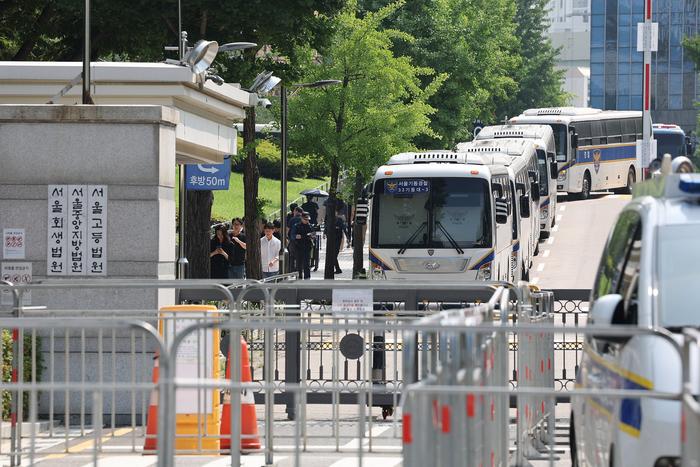
On the afternoon of July 9th, local time, the Central District Court in Seoul, South Korea, reviewed the necessity of the detention order against former President Yoon Suk-yeol filed by the Special Prosecution Investigation Team (SPT) for the investigation into the emergency martial law case initiated by Yoon. On that day, Yoon arrived at the court by car.
△On July 9th, local time, the Central District Court in Seoul, South Korea
On June 6th, while investigating the emergency martial law case related to Yoon’s actions, the SPT accused him of obstructing official duties and forging official documents, requesting a detention from the court. This was the second time since Yoon’s first detention was revoked on March 8th that the investigative authorities have applied to the court for detention. The Central District Court in Seoul is set to review the matter on the afternoon of July 9th and make a decision on whether to detain Yoon. According to past practices, the court is expected to announce its decision on whether to re-detain Yoon later that evening. If the court approves the detention order, Yoon will be held in custody until further judicial proceedings are completed; if the court rejects the detention order, Yoon will return home and continue to appear in court without being detained.
Since last year when he initiated an emergency martial law, former South Korean President Yoon Suk-yeol has consistently resisted summons from the South Korean investigative authorities. In January this year, the South Korean High Public Office Crime Investigation Agency twice attempted to arrest Yoon, who was finally controlled on January 15th. Subsequently, the investigative authorities applied for Yoon’s detention from the court, which approved his detention in Seoul’s Detention Center. After being detained, Yoon continuously claimed that his accusations and arrest were illegal and applied to the court for the cancellation of his detention. On March 7th this year, the South Korean court approved Yoon’s application for the cancellation of his detention, and Yoon was released on the 8th. Following this, he was removed from office as president on April 4th after being tried by the Constitutional Court. During the process of Yoon’s first detention being revoked and his release, controversy arose within South Korea over the interpretation of prosecutorial charges by the court and the South Korean prosecutor’s decision to abandon appeals following the court’s decision to cancel detention. There has been widespread public scrutiny of the fairness of South Korean justice.
Currently, while the SPT is handling the case investigation, criminal trials for the emergency martial law case, which involves charges of internal unrest, are also underway simultaneously. According to court schedules, the trial of this case is scheduled to conclude by the end of this year, with the first-instance verdict expected to be made early next year. Additionally, during the investigation, the SPT may file additional charges against Yoon for other suspicions. (CCTV News Service)
Yoon Suk-yeol’s “internal unrest case” begins